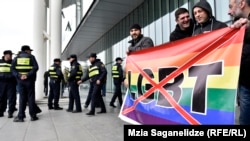'No consideration': Death of transgender woman in Georgia prompts health-care outcry from activists
| Publisher | Radio Free Europe/Radio Liberty |
| Publication Date | 22 July 2018 |
| Cite as | Radio Free Europe/Radio Liberty, 'No consideration': Death of transgender woman in Georgia prompts health-care outcry from activists, 22 July 2018, available at: https://www.refworld.org/docid/5bc05169a.html [accessed 30 October 2019] |
| Disclaimer | This is not a UNHCR publication. UNHCR is not responsible for, nor does it necessarily endorse, its content. Any views expressed are solely those of the author or publisher and do not necessarily reflect those of UNHCR, the United Nations or its Member States. |
July 22, 2018 08:31 GMT
By RFE/RL's Georgian Service, Ron Synovitz
 People gathered in opposition to LGBT rights during a march for International Women's Day in Tbilisi on March 8.
People gathered in opposition to LGBT rights during a march for International Women's Day in Tbilisi on March 8.
TBILISI – Gay rights activists in Tbilisi have taken up the case of a transgender woman who died on July 19 from complications of AIDS, saying the way she was treated by the country's health-care system illustrates a gap between Georgia's antidiscrimination laws and the realities faced by transgender patients.
Nino Bolkvadze, a lawyer from the Tbilisi-based rights group Identoba, says taboos against homosexuality cause many difficulties for lesbians, bisexuals, and gay men in the predominantly Orthodox Christian country.
But Bolkvadze told RFE/RL on July 20 that the 24-year-old who died of tuberculosis at the Batumi Center for AIDS and Tuberculosis, who has been identified only as Lika, faced even greater difficulties as a transgender woman with AIDS.
As a transgender patient, Bolkvadze argued, Lika required special treatment to ensure her "honor and dignity," as required by Georgia's law on patient rights, which forbids discrimination on the basis of sexual orientation.
Georgia's health system has a strategic plan on AIDS, but "there is no consideration in that plan for the special needs of transgender people," Bolkvadze said.
"Transgender people [in Georgia] are often alienated from their families at a very young age," Bolkvadze explained. "When this happens, they don't have access to the education and health-care systems and their economic situation becomes very difficult. They often have to become sex workers to survive, which makes them vulnerable to HIV infection."
"Among transgender people, the HIV infection rate in Georgia is 25 percent, which already means HIV is an epidemic for this group," Bolkvadze said. "If all this is not considered as part of the government's AIDS strategy, then HIV will always be prevalent among transgender people in Georgia and the death rate will be high."
LGBT rights activist Gocha Gabodze told RFE/RL that transgender people sometimes have to pay money for health-care services that would be provided free to others.
"Not everybody knows their rights and what they are entitled to receive from health-care institutions," Gabodze said.
Lika was admitted to Batumi's AIDS and tuberculosis clinic earlier this year when she became too weak from her illnesses to even stand on her own.
In a July 4 interview conducted at the clinic, Lika told the Batumi-based Batumelebi newspaper that doctors were refusing to treat her as a transgender woman – insisting that their patients be treated either as males or females.
"I need special treatment," Lika said, referring to the hormone therapy necessary to bring her body into line with her gender identity. "I need special medicines and a special diet to support my treatment, but I am poor and I can't afford it."
Indeed, medical research shows that cross-gender therapy provides an opportunity to greatly increase the quality of life for transgender AIDS patients by physically affirming their gender identity.
Lika also said that when she was a 6-year-old boy, she was sexually abused by two other boys. She said she became an active homosexual as a young teenager.
At the age of 14, when Lika's family discovered her sexual orientation, she said they sent her away to live with relatives in Tbilisi. But those relatives also kicked her out of their home when they discovered her homosexuality, she said.
She lived in a Christian Orthodox monastery for about 18 months as an adolescent teenager.
It was after she reached adulthood and left the monastery that she became a transgender woman, she said.
"For the last few years, I survived by earning money as a sex worker," Lika said.
Written by RFE/RL senior correspondent Ron Synovitz based on reporting by RFE/RL Georgian Service correspondents Nino Tarkhnishvili in Tbilisi and Eka Lordkipanidze in Batumi
Ron Synovitz is a senior correspondent for RFE/RL.
Link to original story on RFE/RL website
